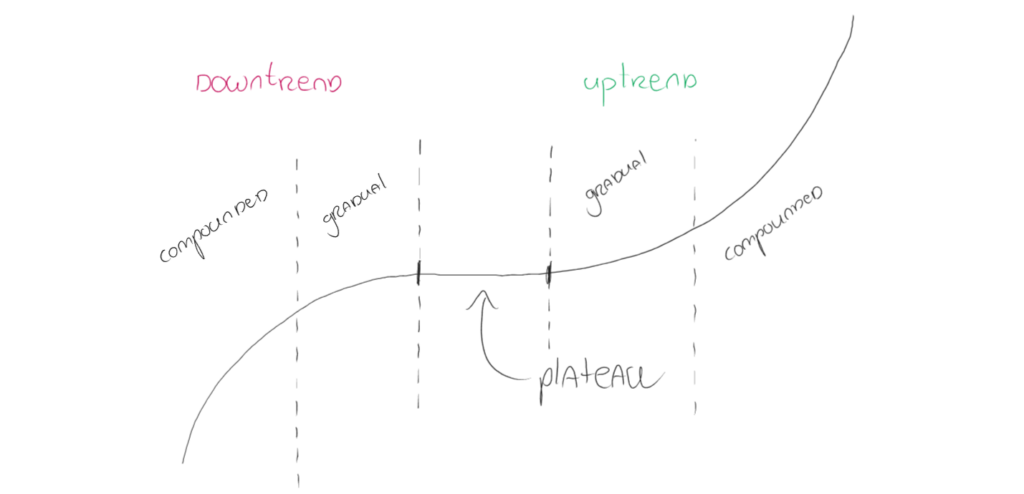Often when we talk about setting goals, we do so from the outside-in. We look at ourselves from the third person’s perspective. We see where we are currently at and then where we would like to be in the future.
Maybe you want to run a marathon, or get your degree without a delay. Maybe the goal is as simple as getting up when your alarm goes off, or seeing your parents more often.
All these goals describe some state of ourselves and the outside world. While these goals are important, we should recognise that in the end, they are instrumental to how we wish to experience life. In a way, they are instrumental to the goals of our inner world—our aspirations for life. ⭐
Staring from the inside out
In a previous article, I described the process of developing your inner philosophy: an intricate structure that connects your goals, habits, and principles to your aspirations, and your aspirations to the values you cherish in life.
For example, I identified an aspiration to ‘enrichen my experiences.’ Contributing to this aspiration, I wanted to read the book ‘on having no head’ (goal), do something out of my comfort zone every week (habit), and live by the principle of having curiosity, and not fear, govern my decisions.
In the exercise, I touch on the importance of being aware of how your goals contribute to your aspirations. Knowing why you are pursuing some goal is a powerful intrinsic motivator to help you keep at it. This is especially pertinent when you have one goal contributing to multiple aspirations at the same time.
In a similar way, the absence of any goal-aspiration link could show that you’re pursuing a goal misaligned with your aspirations. In such cases, re-evaluating whether the goal is actually something you want is a worthwhile endeavour.
Obliviousness to progress on the aspirations of our inner world
Virtually any productivity book talks about the importance of making our goals SMART1. Keeping track of your goals in a systematic way helps you to see what seems to work and to see what doesn’t. It helps us to achieve our goals by enabling us to adapt our strategies in a timely manner.
Why do we not do the same for our aspirations? Isn’t it more important to measure whether all our ambitious goals, habits and principles contribute to the higher end—the aspirations and values of our inner life?
Meditating consistently, taking mindfulness breaks, listening to weekly readings in the Waking Up app… We can muster all the willpower and time to do these things perfectly, but what if, despite our efforts, they don’t make us feel any more mindful than before? Ignoring our aspirations will ultimately undermine our drive to persist.
But how do we assess our aspirations?
Unlike goals, habits, and principles, they are not really measurable. You do not ‘achieve’ an aspiration, you can only get closer or further removed from it. You may spend 100 hours on a goal related to an aspiration, but that doesn’t necessarily mean you are making any progress on the latter part.
Below, I want to pitch an idea for a new way of measuring progress, which is (maybe uniquely) suitable for aspiration-assessment.
Measuring progress towards aspirations: the momentum framework
Aspirations are, by definition, unachievable and vaguely defined. This makes it impossible to measure our progress on an absolute scale. We can, however, use introspection to see whether or not we are getting closer.
Let’s take the example of the aspiration to ‘be mindful.’ While I cannot pinpoint why exactly, I feel like I can always say whether I’m feeling more or less mindful than before. In other words, I can always say whether I’m in an uptrend, downtrend or plateau. Furthermore, the up- and downtrends can be gradual and steady or seemingly exponential. In the latter case, things are not just going better, but in some sense even reinforcing themselves; it is a compounded trend. 📈

So, what about assessing our aspirations, one-by-one, every 2–3 months using such a momentum-scale? When we put a lot of effort into habits, goals and principles without seeing even an gradual upward trend, shouldn’t we take a step back and re-strategise?
What do you think? How do you measure progress on your aspirations (if at all)? What ‘period’ are we talking about when we say we are feeling more mindful than ‘before’? Don’t hesitate to share your insights in the comments below! 👇